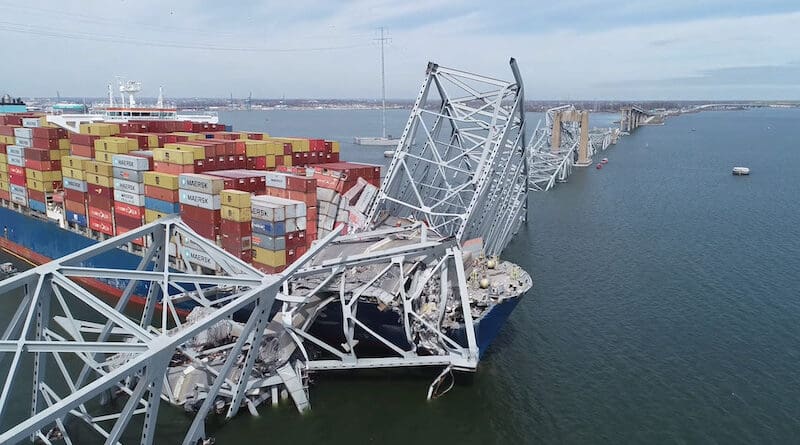The Baltimore Bridge Collapse: Conspiracy As Mother’s Milk – OpEd
The human mind is often incapable of tolerating the limitless nature of a universe, the absence of a divine architect, or appreciate that intended designs may be absent when it comes to events awful, ghastly and catastrophic. A disaster with some human agency is bound to have arisen because of a constructed plan, a template to harm, a scheme to injure.
The collapse of the Francis Scott Key Bridge in Baltimore was another event to befuddle those searching for the plan. The Singaporean-flagged MV Dali container ship lost power on March 26 and collided with the bridge in the early morning, causing the dramatic destruction of the bridge and the deaths of six construction workers who fell into the Patapsco River.
The authorities were quick scotch notions of foul play. FBI Baltimore stated that there was “no specific and credible information to suggest any ties to terrorism at this time. The investigation is ongoing.” President Joe Biden, while betraying confusion about whether he ever travelled by train over the bridge or not – an impressive feat if so, given that the bridge never had train lines – described it as “a terrible accident. At this time, we have no other indication – no other reason to believe there was any intentional act here.”
The Kraken of conspiracy had, however, been unleashed. Andrew Tate, the Count of Online Misogyny, was quick to the digital podium in suggesting a cyberattack. In a post of breathless excitement, he notes how the “Lights go off and it deliberately steers towards the bridge supports.” For the influencer facing charges of human trafficking, forming an organised crime group, and sexual assault in Romania, this was the work of “Foreign agents of the USA”. With apocalyptic flavour, he declared that a “Black Swan event” was imminent.
With tearing speed, former security advisors and current political representatives made their offerings of conspiratorial theory. Former US national security advisor Michael Flynn, who pleaded guilty to lying to the FBI about meetings with Russia’s ambassador to the United States leading up to Donald Trump’s inauguration in January 2017, added his own agreement with Tate. “Black swans normally come out of the world of finance (not military) … There are harbor masters for every single one of these transit ports in America that are in charge of assuring the safety of navigation … start there.” How exciting.
Former Florida state congressman Anthony Sabatini preferred a vaguer, more intangible culprit, identifying the enemy ideologically. It all came down to a policy of diversity, equity and inclusion, with the insinuation that the swarthy types were responsible. “DEI,” he stated with certainty, “did this.” Rep. Marjorie Taylor Greene (R-GA) worried whether this was “an intentional attack or an accident” and demanded an investigation, the very thing happening even as she bloviated on the subject.
Almost on cue, culturally charged theories began to froth and bubble. Matt Wallace, yet another cerebrally overheated influencer with 1.6 million followers, drew a comparison (and connection) between the collapse of the bridge and the Obama produced Netflix film Leave the World Behind, which featured a cargo shipping losing power and running aground on the coast of Long Island.
In the film, the ship’s destination is Sri Lanka. The country’s national flag sports a lion. The MV Dali’s destination? Sri Lanka. The name of the cargo vessel in the film? White Lion. Celluloid could be effortlessly married to harmful plot and wicked design, or what another overly exercised social media user drunk on Christ and premonition liked to call “predictive programming”.
On CNN, Transportation Secretary Pete Buttigieg was trying to calm matters. “We’re in the business of dealing with roads and bridges and sometimes ships and trains. So we are not in the habit as a Department of Transportation, of being in the business of dealing with conspiracies, or conspiracy theories or that kind of wild thinking. But unfortunately, it is a fact of life in America today.” This, at best, is an airy reading of history.
The lifespan of the US Republic has been one of numbing conspiracy. In the land of Hope and Glory, with Freedom’s wash, conspiracy is mother’s milk. The Salem witch trials in Massachusetts pointed to Satan’s industrious work; the fledgling republic feared the clandestine seizure of power from within by well organised European elites. In the 1800 presidential race, rumours were sown by the Federalist Party that the wily Thomas Jefferson, a Democratic-Republican, was a closeted atheist keen on handing over the new state to France on his election. Jefferson won, and far from surrendering territory to France, doubled the size of the US with the purchase, from France, of 828,000 square miles.
At its creation during the Cold War, the John Birch Society, after ventilating about global communist conspiracy and home-grown threats, redirected its focus to the fanciful conspiracy that the United Nations was keen on world government and trimming US sovereignty. This was much too flattering: the UN is rarely united and more akin to a collection of fractious tribes in permanent disagreement.
The problem with conspiratorial overheating is that the residual ash in the incineration can provide clues to something distantly plausible. This is helped by the fact that governments and state institutions have not been shy in breaching the social contract with the citizenry. The deep state notion, for instance, is laughed off by the very people who represent such interests and regard it as a crank’s viewpoint.
Fundamentally, there is no need for conspiracy when there is a consensus, an understanding of agreed-upon facts and agreed-upon hierarchies of power. But as for such calamities as befell the Francis Scott Key Bridge, never let human imbecility, incompetence and error off the hook. To misjudge is to be human.

